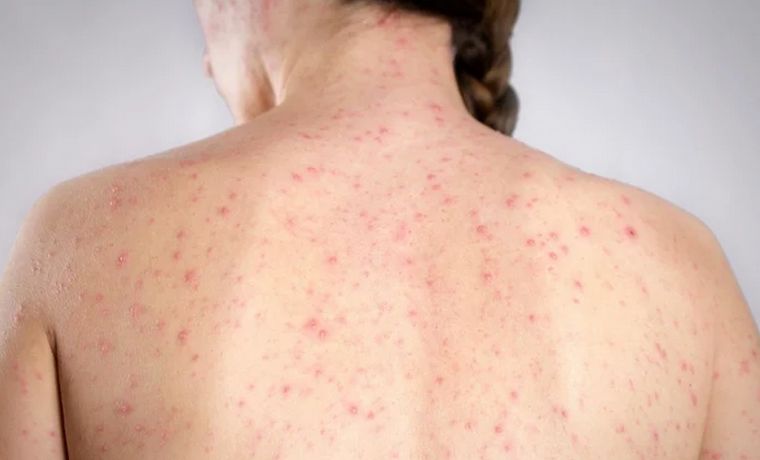The Minister of Health Carla Vizzotti confirmed this afternoon a case of measles in a resident of the city of Buenos Aires contracted in the Middle East and recalled that “the drop in vaccination coverage in the world, due to the pandemic, is a situation that put us at risk.”
Vizzotti warned that “globalization and the increase in the important circulation of measles in many countries around the world, meant that we had an imported case, and from there the risk of an outbreak.”
He also stressed that they have just “confirmed the case” through the ANLIS-Malbrán. “The PCR was positive and now we are notifying it,” he added in a sustained dialogue with Radio con Vos.
The director of Epidemiology at the Ricardo Gutiérrez hospital, Ángela Gentile, explained to chain 3 that “with the pandemic, vaccination coverage in Argentina and America fell.”
/Home Embedded Code/
Look also
New stage of the pandemic
——
/End Embed Code/
“The first dose of the triple viral, which covers measles, is received in the first year of life, and the second when they enter school. Today the coverage does not reach 80% of the population and this virus is of respiratory transmission, so that needs coverage of 90% and more. That’s why it’s important to complete schemes,” he stressed.
Regarding the current situation, the minister explained that, together with CABA, “the investigation of the case is being carried out, which consists of the investigation from the beginning of symptoms of all contacts, if any of them have symptoms.”
“The alert that was issued over the weekend is for the health team, to greatly sensitize diagnostic suspicion and sample collection, and for the population if they have any symptoms such as spots on the skin, fever, conjunctivitis, rhinitis.”
In these cases, Vizzotti recommended consulting “immediately to be able to minimize the impact and, of course, control the vaccines, that we all have the vaccines up to date.”
The measles vaccine is on the calendar after one year of life and school entry, so all boys and girls between 12 months and 5 years old should have at least one dose, the minister added.
Regarding doubts about whether individuals are vaccinated or not, for example, in the face of losing their vaccination card, he stated that “the idea is to also get the vaccine. It doesn’t matter if we have one dose too many, the important thing is to try to generate the security of having antibodies, defense and immunity”.
“This vaccine, unlike the flu or COVID-19 vaccine, is a vaccine that has really made Argentina free of endemic measles since 2000. Having the disease gives us long-term immunity, and having the complete schedule of Vaccination prevents us in more than 95% from the possibility of having it,” added Vizzotti.
Measles is a disease that can be eliminated because the only reservoir is the human being, unlike respiratory viruses.
“So if we get vaccinated we can really limit the circulation of the virus, not just complications and deaths, but the circulation of the virus,” Vizzotti concluded.
On November 23, the Ministry of Health issued an alert for the “risk of reintroduction” of measles in Argentina.
“There is no specific treatment for measles, however, for prevention there is a safe and effective vaccine available in the National Vaccination Calendar of Argentina,” it was recalled then.
Upon notification of the possible case, the Ministry issued an “epidemiological alert” and urged “health teams to intensify epidemiological surveillance of the febrile exanthematous disease (EFE), immediate notification and implementation of control actions upon detection of suspected cases to prevent reintroduction of the virus into the country.
Health personnel were reminded that the case definition is “Febrile Exanthematic Illness (EFE)”, that is, a patient with fever (axillary temperature greater than 38ºC) and rash, or any case in which the health professional suspects measles. or rubella.
Any suspected case of EFE must be reported to the National Health Surveillance System within 24 hours of detection without waiting for laboratory results.
In Argentina, the last endemic case was registered in 2000, and since the elimination of the disease until 2018, 43 imported and “import-related” cases were registered.
Between 2019 and 2020, 199 cases of measles were confirmed, 18 of them imported, 2 related to importation and 179 of unknown origin.
Given that the measles virus continues to circulate in other countries of the region, and given the decrease in vaccination coverage, the Ministry of Health urged “to maintain high vaccination coverage with two doses of measles vaccine (double or triple virus)” and asked the health system to “articulate protocols for early detection of the disease through a sensitive surveillance system that prevents dissemination.”
He also recalled that the vaccine with a measles component on the occasion of a trip must be applied at least 15 days before departure.
Report by Ariel Rodriguez.
–


/data/photo/2022/03/29/6242620bbc745.jpg)